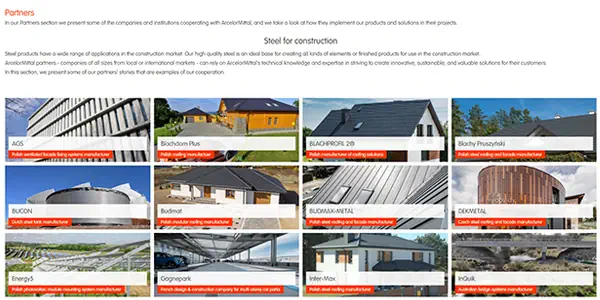More case studies with Heavy plates
More case studies with Cofraplus®
Similar case studies Office buildings
Repsol Campus Madrid: Giant steel frames define industrial image and provide solar protection
The new headquarters of the energy company Repsol is a modern complex in the city centre of the Spanish capital. Conceived like a university campus, it consists of four buildings arranged around a central garden. The giant steel frames embracing the buildings make the complex stand out in its urban surroundings. ArcelorMittal supplied heavy plates for the frames and composite flooring.
Detailed information
123 000 square metres of office and common spaces - open, flexible, and suffused with light: The new headquarters of Repsol offer 4000 employees a comfortable, more balanced working environment where collaboration and exchange of ideas are central.
Inspired by the team work atmosphere of a univeristy campus, Madrid based architect Rafael de la Hoz and his team designed a complex where the horizontal lines win over the the vertical ones. The buildings have only five floors. De la Hoz picked up the concept of the central yard as a meeting point, the social importance of which can be followed throughout history from the ancient roman family patio over the medieval cloister to modern campus complexes.
It was in the US, where, after WWII, the concept of the university campus was first applied to the design of company headquarters. The aim was the same – to create a space for social gathering and find synergies between the different departments and businesses, while not forgetting that buildings with lower height create a less hierarchical structure than skyscrapers.
High-rise buildings are usually the only solutions in city centres due to the limited space. The fact that Repsol owned this enormous plot in the southern part of Madrid's centre made it a lot easier to implement the spacious campus concept. The garden areas invite one to take a walk, and the buildings are connected with footbridges.
Another important criteria was the 'design for all approach making the buildings a 100% accessible complex and integrating people with any kind of disability in order to create equal possibilities for everyone.
Industrial image
Characteristic for this complex are the 105 giant steel frames that embrace the buildings. These arches or 'ribs' define the industrial image of the energy company. Each of them is 24 m high and weighs 50 tonnes.
As part of the structure, they contribute to the building's physics. They allow for open and flexible interiors and at the same time are the frame for 45 000 square metres of glazed facades. The arches are directly supported by the building's basement, the ground floor that houses common spaces like the auditorium, health care installations, and the convention centre.
The arches not only have a structural and image function, they also present a solution to a problem very common in Spain due to the climate: they let in the light, but not the heat.
The great 'ribs' protect the glazed facade from direct sunlight as they provide shadow without blocking the light.
ArcelorMittal provided heavy plates for the arches and composite flooring. In total, 20 000 square metres of Cofraplus® steel sheets were supplied.
Interiors and garden
The interior design, done by Estudio Rosselini, joins in the quest for transparency and openness. As such, the open office spaces are situated close to the facade, and the furniture does not obstruct the views. Individual offices and meeting rooms are located in the centre of each floor. Apart from the central yard, there are many green terraces.
The central garden, designed by landscaping artist Till Latzman, is crucial in the campus concept and occupies a third of the total surface. A variety of local plants were used, among them pine trees and thyme – all of them used to the dry climate in Madrid. A well crosses the green area, ending in a murmuring cascade close to the cafeteria.
Sustainability
The campus is designed to be sustainable, saving 22 tonnes of CO2 annually. 100% of the energy comes from renewable sources thanks to 1700 m2 of photovoltaic panels. Parking for bicylces and electric cars with charging stations are available, and the rainwater is stored and used for watering the 20 000 m2 garden area. It aims for the LEED Gold certification as energy efficiency is being evaluated in the next months and years.
It is a company campus that, instead of standing out, wants to integrate into its urban surroundings. The area around Mendez Álvaro Street, a former industrial area in Madrid, is in the process of being restructured - new office buildings in addition to residential buildings are underway. Therefore, it was important not to take away the light in the neighbourhood, which could be achieved thanks to the limited building height.
Project information
- Madrid
- Spain
- Architect:
Rafael de la Hoz - 2007 - 2013
- Client:
Repsol YPF - Photographer:
Repsol

























